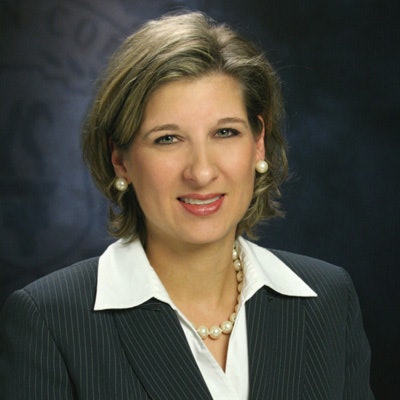American College on Education (ACE) president and interim provost Dr. Shawntel Landry leads a nontraditional and unique institution, where women account for 72 percent of administrative or staff roles.
Under Landry’s leadership, ACE continues to demonstrate that women leaders in higher education can simultaneously achieve work-life balance and effectively play a key role in the development of students’ mastery of learning outcomes at their institutions.
“Across students, faculty, staff, our executive team. . . you just don’t see that many women leaders anywhere,” Landry told Diverse in a phone interview. “We have a lot of conversations at ACE about the value of balancing our lives and making sure that if our personal lives are good, our professional lives will be, too.”
 Dr. Shawntel Landry
Dr. Shawntel LandryACE primarily serves educators and students completing their degrees go on to serve in the education profession in some aspect. The institution’s officials and faculty members, practicing balance in their own lives, also understand that students will have families, that they may be working full-time and that students will have outside responsibilities.
Instead of leaving students to deal with outside realities such as the loss of a parent or the birth of a child, for example, ACE faculty may say, “‘Let’s get you an incomplete in this course…when can you come back?’ ‘How can we help you so that you still can go to school while you’re dealing with the realities of your life?’” Landry said.
Students have also shared stories of completing online assignments at their child’s soccer games, Landry added. “They’re not missing their life in the middle of it, and that’s what’s so important.”
ACE does not fit the traditional institutional mold as a faculty- or research-centric institution, Landry said, in part, because courses are online. Boasting a student-centric model, the institution focuses on a student’s mastery of their program outcomes as demonstrated in final capstone courses.
In these final courses, students write in-depth papers detailing how well they have mastered outcomes, what work they have done and “they are exceeding on their state exams,” Landry said. Student candidates to be principals across the country are also surpassing state averages in most places, she added.
“So we know what we are producing is quality, and it’s really getting that message out to students that you can have an institution that focuses on students…you can have an institution that is high-quality and low cost,” Landry said. “Those two things typically don’t go together, but we’re working really hard to demonstrate that they can.”
Landry believes that online education will be the next step for higher education as more adult learners are going back to pursue degrees. Due to her own experiences traversing the educational pipeline with young children, she makes the effort to model for her ACE team and students that her family is important by letting them know when she is going to pick up her children, by discussing activities that she and her kids do in the evenings and by sometimes bringing her kids into work with her.
“I tell them all the time, ‘I don’t expect you to miss something at your child’s school at two in the afternoon. Just work around that. Go to your child’s school when you need to. Do what you need to do for your family, and put in your time elsewhere to make up for it,’” Landry said.
The institution has also implemented new policies to actively embrace and demonstrate the mission of balance, access and service that Landry hopes will continue at ACE, a private benefit corporation.
ACE officials now have maternity and paternity leave, bereavement leave and days to complete civic service or a volunteer opportunity of their choice. The institution has changed its time-off policy to be a straightforward process, where staff does not have to tell if they are sick or not.
Landry notes that by giving faculty and staff the ability to make choices about work-life balance that are in their best interests, the institution will “see the benefits” of those choices in how the institution serves its students.
This understanding has made her an effective leader. And as one of the only women presidents in the state of Indiana, Landry admits that she did not intend to be in higher education, let alone a college president. The administrator initially started out as a K-12 elementary school teacher in Louisiana and Texas and from there she transitioned to developing K-12 curriculum.
However, Landry felt that she would have the most impact and reach for teachers and educational professionals in the higher education realm. She earned a joint MBA and doctorate in educational leadership at Texas Christian University, and after conducting further research, began her educational leadership journey at ACE in 2009.
One female mentor Landry recalls working under held a role that she wanted to do at ACE: curriculum development. The mentor spent time walking her through “What do you need to know?” “Who do you need to interact with?” “How do you get to those types of leadership positions?” Landry concluded, “So it was easier to envision myself doing it here because I have had great women leadership.”
Because of this hands-on women’s leadership that “made a huge difference,” Landry pays it forward for future educators by working to make an ACE education more accessible and flexible.
“I want [students] to feel like there is a way to do it and fit it into their lives and that they are not sacrificing everything in their lives in order to continue to learn,” she said. “I really want to make it as nimble and flexible as possible so it meets them where they are, and it’s all about mastery.”
Tiffany Pennamon can be reached at [email protected]. You can follow her on Twitter @tiffanypennamon.















